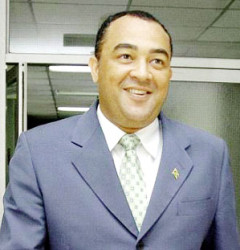(Jamaica Observer) A recommendation by Opposition Senator Dr Christopher Tufton that a bipartisan committee be established and given a timeline of 12 months to hammer out differing views on the Caribbean Court of Justice (CCJ) has been accepted by the Government.

The Administration’s position was revealed by Senator AJ Nicholson, the leader of Government Business in the Senate, at the first of two news luncheons for the Government and Opposition hosted by Jamaica Observer Chairman Gordon ‘Butch’ Stewart at the newspaper’s headquarters in Kingston, Tuesday, ahead of the impending general election.
On Tuesday, when the issue of the Government’s push for Jamaica to accept the CCJ as the island’s final appeal court was raised, Nicholson, one of the Administration’s most vocal proponents of the regional court, made it clear that the Government would not back away from its position. However, Nicholson, who is also the minister of foreign affairs and foreign trade, said his side would accept Tufton’s suggestion.
Last Friday, in his contribution to the debate on three Bills seeking to replace the United Kingdom Privy Council with the CCJ, Tufton told the Upper House that a bipartisan approach to making the decision would be a better alternative than proceeding with a vote in the Senate.
He offered four suggestions to the Senate for consideration:
* establish a bipartisan committee to accept the things that have been agreed on and revisit the points of divergence;
* set a timeline of 12 months to conclude discussions on these issues;
* increase public awareness and participation through public consultation and education; and
* consult the people through a referendum at the end of that period.
“Senator Tufton has placed on the table — not the first time by the Opposition — that in a year we should not take the vote,” Nicholson said on Tuesday. “We are going to do that. We have to take them at their word that within a year we’ll see what can happen,” he added.
The Constitution (Amendment) (Caribbean Court of Justice) Act 2015; the Judicature (Appellate Jurisdiction) Act, 2015; and the Caribbean Court of Justice Act, 2015, were debated and passed on May 12 in the House of Representatives, where the Government enjoys the two-thirds majority needed for approval. However, the Opposition voted against all three Bills and appears likely to do so in the Senate. The Opposition is insisting that the matter be decided by the electorate in a referendum. However, the Government argues that the constitution does not require or contemplate that the proposed changes be put to a referendum, once the Bills are approved by a two-thirds majority in both Houses of Parliament.
On Tuesday, Nicholson said that both sides have agreed that it’s time to move away from the Privy Council. He pointed to a proposal by the Opposition that Jamaica establishes its own final appeal court, but reminded that the prime minister had already told them that that is not on for the immediate future.
“Now, then, what better thing to do, since both of us agree to move away from the Privy Council, than to have the CCJ, even as an interim court,” Nicholson said.
“I can tell you, we are not reneging on this, because it is for the benefit of the people of Jamaica,” he said, adding that 99 per cent of Jamaicans cannot afford to go to the Privy Council.





